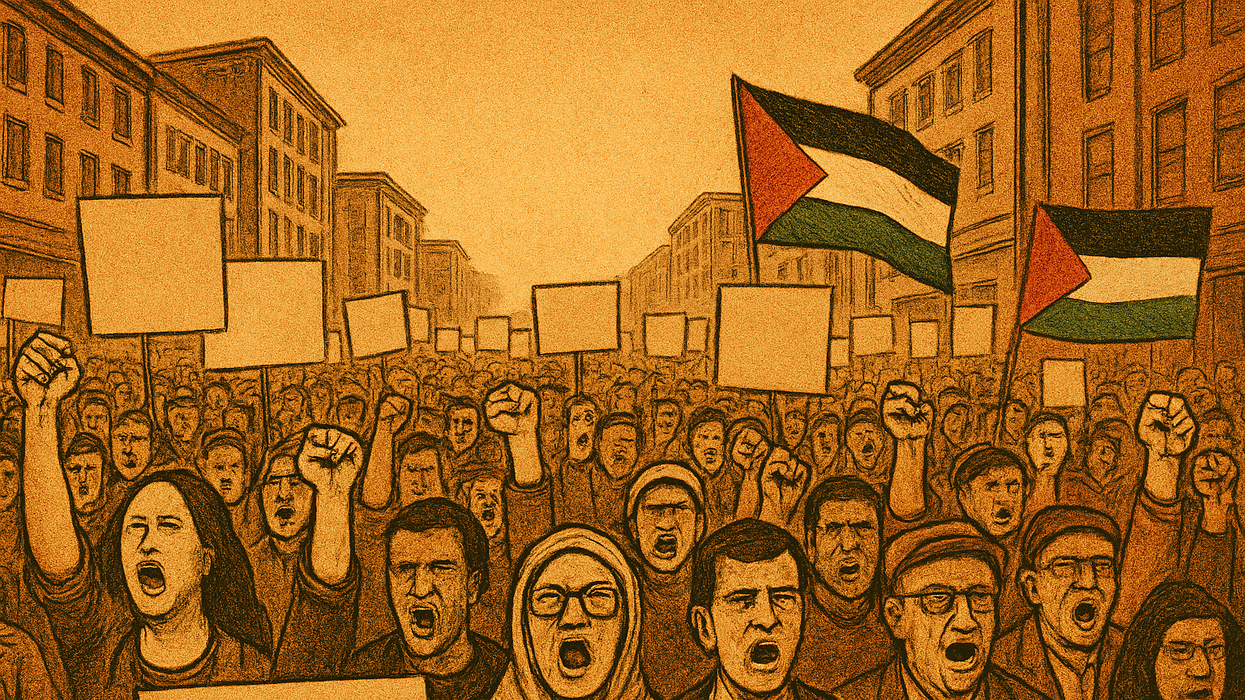The past two years have witnessed an unprecedented outpouring of passion and energy in defense of Palestinian lives. Since October 2023, more than 22,000 rallies, marches, vigils, and blockades have been held across the United States. They have brought millions into the streets, blocked airports and bridges, and filled the squares of our cities with chants of solidarity.
And yet—what has changed? Gaza is still under siege, its population slaughtered every single day, and a famine is decimating a whole generation of Palestinian children who, if they don’t die of hunger, are likely to suffer for the rest of their lives the physical and emotional trauma of famine and the terror they are enduring daily. All along, U.S. policy has remained firmly aligned with Israel, with the flow of weapons uninterrupted.
It is time to admit a painful truth: Protest - no matter how vociferous, no matter how righteous – without political imagination is not a strategy: It is an ineffectual ritual. And when sustained over time, it risks becoming a form of catharsis for the powerless rather than a lever to actually shift power.
History offers proof. The massive demonstrations against the Iraq and Afghanistan wars did not halt the invasions or occupations. Obama was not swayed by the protests after the 2008 financial collapse — he rescued the bankers who caused the meltdown, not the families who lost their homes. Even the Watergate hearings, which were propelled by public outrage, revealed how quickly righteous passion can be fragmented, manipulated, and ultimately co-opted.
Meanwhile, those who seek power on the right understand something too few on the left are willing to learn: Political change is won by seizing the levers of power, not chanting outside their doors. The right does not pour its energy into endless protest. Instead, it organizes quietly, takes over school boards, funds candidates, and wins congressional and statehouse seats. Once in office, they use that power—even to push policies opposed by the majority of Americans.
Contrast that with AIPAC. It does not organize rallies in the streets. It does not depend on spectacles of moral witness. Instead, it pools money, recruits candidates, funds them lavishly, and threatens any elected official who dares step out of line. AIPAC has built a political machine—precisely because it understands that in America, policy does not follow the loudest chant; it follows the flow of money and the hard mechanics of winning seats.
Just sit down and imagine this: Imagine if the enormous energy expended in those 22,000 pro-Palestine demonstrations had been directed differently.
Imagine if, in every state, activists chose a single congressional district, recruited an unapologetic pro-Palestine candidate, and poured their resources and energies (think of all the money spent on gas, metro fees, food, flyers, drums to bang on, loud speakers, Keffiyehs, etc., etc.) into getting them elected.
Imagine if, rather than pleading with those in power, a movement had been quietly and resolutely built that made it clear the time for pleading was over, and that the time to reclaim power had begun.
Imagine the political earthquake caused by the influx of 50 new members of Congress who were arriving to change the whole rotten, immoral game.
More crucially, imagine the new era we would have launched where the people, inspired by such a stunning victory that went from “we have had it” to “we are here to govern ourselves," start mobilizing for the next cycle, now fully certain that they can seize their destiny by the horn and assert their will through the ballot box, with their elected candidate fully understanding that they will remain in office only with the grace of their now fully and self-consciously empowered constituency.
And there are many precedents to this.
The Tea Party, with far fewer bodies in the streets than the anti-war movement, transformed the Republican Party by targeting primaries, ousting incumbents, and sending shock waves through Washington. The Christian Right did the same a generation earlier, burrowing into local school boards, judicial appointments, and congressional races until it reshaped the national conversation. These movements understood that policy follows power, and power is won at the ballot box, not at the barricade.
Today, the American public is decidedly and demonstrably pro-working class on the core issues that matter: Healthcare, wealth inequality, reproductive rights, foreign policy restraint. And yet, despite this numerical advantage, those who claim that they are champions of their constituency routinely fail to wield the power they are given on behalf of those who voted them in. Why? Because too many politicians see office not as a vehicle to represent the will of the people but as a springboard to a career to be reliably financed by the same deep-pocketed interests who profit from the status quo.
That is why protests, however righteous, often leave so little behind. They may raise awareness, they may create moments of solidarity, but unless they translate into institutional power, they dissipate.
The right understands this. AIPAC understands this. Until the pro-Palestine and by extension the pro-working class movement learns this and acts on it as well, it will continue to expend oceans of energy in ritualistic protest, while the machinery of policy grinds on untouched.
The real courage today lies not in the streets but in the ballot box — in refusing to beg those in power to listen, and instead on building a movement that seizes power from them.




















Trump & Hegseth gave Mark Kelly a huge 2028 gift